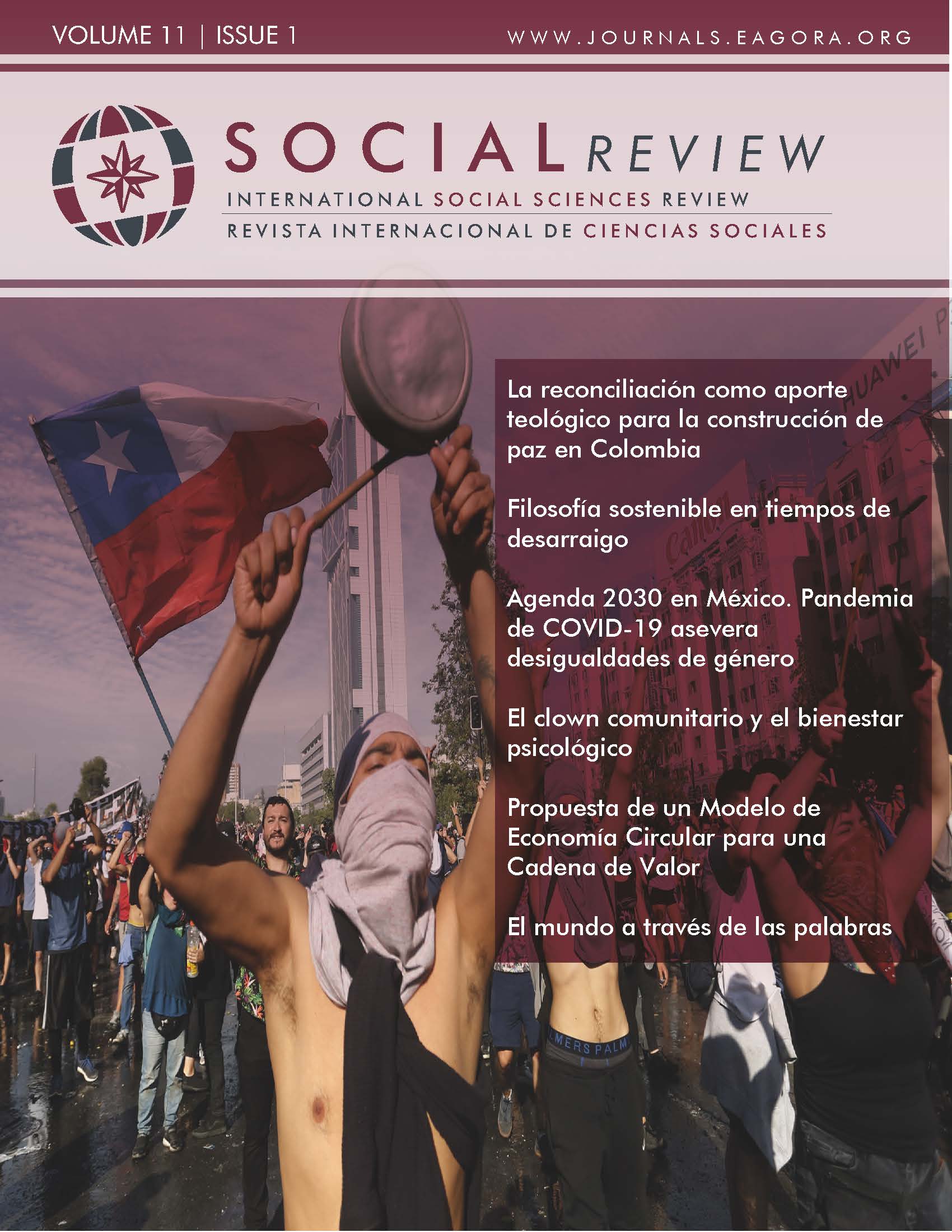Proposal of a Circular Economy Model for a Value Chain
DOI:
https://doi.org/10.37467/gkarevsocial.v11.3421Keywords:
Circular economy, Model, Food Industry, Dairy sector, StrategiesAbstract
Currently the food industry works under a linear production system using significant amounts of natural resources and producing vast amounts of waste. Cartagena de Indias is one of the territories with this problem. This paper aims to analyze the impact that the enterprise Coolechera is causing applying the theory of the circular economy. This paper is divided in three sections, first the characterization of the enterprise’s value chain, second the diagnostic of its missional processes according to the circular economy theory, and finally the proposal of strategies and models for promoting a transition to a circular production system.
Downloads
Global Statistics ℹ️
|
1101
Views
|
684
Downloads
|
|
1785
Total
|
|
References
Cartagena Cómo Vamos. (2017). Informe Calidad de Vida 2017- Ambiente. https://bit.ly/3B4aQhb
Castañeda Castro, L. H. (s. f.). Empaques y Medio Ambiente: Gestión de Residuos Sólidos. Catálogo del Empaque. https://bit.ly/3B8x8hS
Departamento Nacional de Planeación, Biointropic, & Universidad EAFIT. (2018). Estudio sobre Bioeconomía. Análisis del Sector de Alimentos y Bebidas. https://bit.ly/2KkPDFP
Do Rosario, F., Concepción Toledo, D. N., Barrios Castillo, G. y González Suárez, E. (2014). Gestion de los Residuos Sólidos y sus Impactos Económicos, Sociales y Medio Ambientales. Revista Centro Azúcar, 41(4), 9-20. https://bit.ly/3KEh0YE
Ellen MacArthur Foundation. (2017). The Concept of a Circular Economy [Institucional]. https://www.ellenmacarthurfoundation.org/circular-economy/concept
Ellen MacArthur Foundation. (2018). Cities and The Circular Economy for Food. Ellen MacArthur Foundation. https://ellenmacarthurfoundation.org/cities-and-circular-economy-for-food
Food Drink Europe. (2018). Ingredients for a Circular Economy. https://bit.ly/3eiK8Za
Gardiner, B. (2015). How Growth in Dairy Is Affecting the Environment. The International New York Times. https://nyti.ms/3q3fSEm
Gil, M. J., Soto, A. M., Usma, J. I. y Gutiérrez, O. D. (2012). Contaminantes emergentes en aguas, efectos y posibles tratamientos. Producción + Limpia, 7(2), 52-73. https://bit.ly/2MU2SyQ
Hernández-Berriel, M. del C., Aguilar-Virgen, Q., Taboada-González, P., Lima-Morra, R., Eljaiek-Urzola, M., Márquez-Benavides, L., & Buenrostro-Delgado, O. (2017). Generación y Composición de los Residuos Sólidos Urbanos en América Latina y el Caribe. Revista Internacional de Contaminación Ambiental, 32(1). https://bit.ly/3wQHz73 DOI: https://doi.org/10.20937/RICA.2016.32.05.02
Hurtado, J. (2000). Metodología de la Investigación Holística. Fundación Sypal.
Martínez Reyes, M. C. (2017). La Problemática de la Cultura del Empaque: Del Diseño Centrado en el Consumo, al Diseño Centrado en la Función Ambiental. [Trabajo de grado, Maestría, Universidad Nacional de Colombia]. https://repositorio.unal.edu.co/handle/unal/58688
Montero Castillo, P. M., Rodríguez Meza, J. E., & Martelo, R. J. (2018). Environmental Impacts of Agriculture, Livestock and Dairy Sector, 11(30), 1477-1489. https://bit.ly/3TCWBaA DOI: https://doi.org/10.12988/ces.2018.84140
Murillo Aguirre, J., & López Pedraza, D. (2016). Caracterización de la Cadena de Valor del Sector Lácteo Colombiano [Trabajo de grado, Universidad de la Salle]. https://bit.ly/3q6Y774
Osorio Gómez, J. C. (2017). Introducción al Pensamiento Sistémico. https://bit.ly/3KHHBUv
ProColombia. (s. f.). La Industria de los Lácteos en Colombia. ProColombia. https://bit.ly/3CSBcUW
Programa de las Naciones Unidas (PNUMA), Establecimiento Público Ambiental del Cartagena, & Observatorio del Caribe Colombiano. (2009). Perspectivas del Medio Ambiente Urbano: GEO Cartagena. http://www.pnuma.org/deat1/pdf/2009%20-%20GEO%20Cartagena.pdf
Puerta Valenzuela, D. C., Lambraño Escobar, L. L., & Cadrazco Florez, V. J. (2012). Estrategias Logísticas para un Desarrollo Sostenible [Proyecto de Investigación para optar al título de Ingeniería Industrial, Universidad de San Buenaventura]. https://bit.ly/3BaHrSJ
Restrepo Gallego, M. (2006). Producción Más Limpia en la Industria Alimentaria. Revista Producción + Limpia, 1(1). http://repository.lasallista.edu.co/dspace/handle/10567/217
World Wide Fund For Nature (WWF). (2018). Food for Thought: 91 PerCent of People Don’t Realize our Food System is The Greatest Threat to Nature, WWF survey. WWF. https://bit.ly/3q6wT0l
Downloads
Published
How to Cite
Issue
Section
License
Those authors who publish in this journal accept the following terms:
-
Authors retain copyright.
-
Authors transfer to the journal the right of first publication. The journal also owns the publishing rights.
-
All published contents are governed by an Attribution-NoDerivatives 4.0 International License.
Access the informative version and legal text of the license. By virtue of this, third parties are allowed to use what is published as long as they mention the authorship of the work and the first publication in this journal. If you transform the material, you may not distribute the modified work. -
Authors may make other independent and additional contractual arrangements for non-exclusive distribution of the version of the article published in this journal (e.g., inclusion in an institutional repository or publication in a book) as long as they clearly indicate that the work was first published in this journal.
- Authors are allowed and recommended to publish their work on the Internet (for example on institutional and personal websites), following the publication of, and referencing the journal, as this could lead to constructive exchanges and a more extensive and quick circulation of published works (see The Effect of Open Access).













